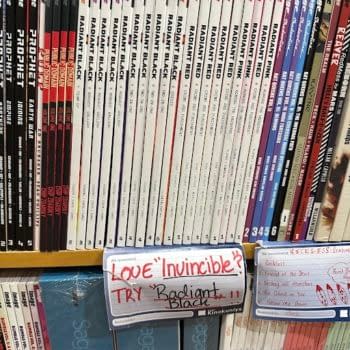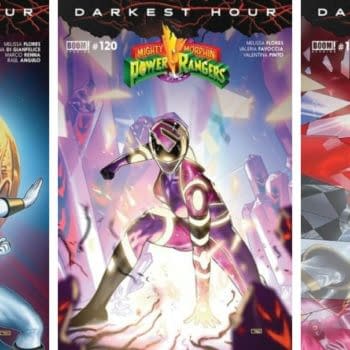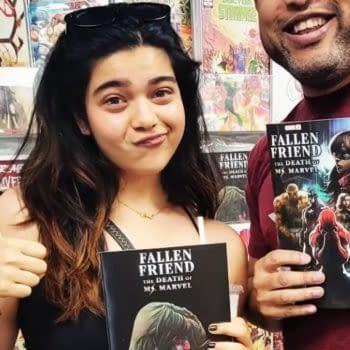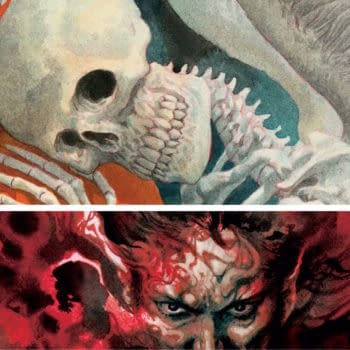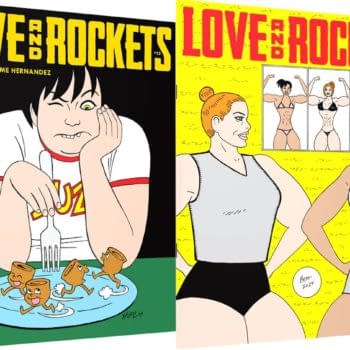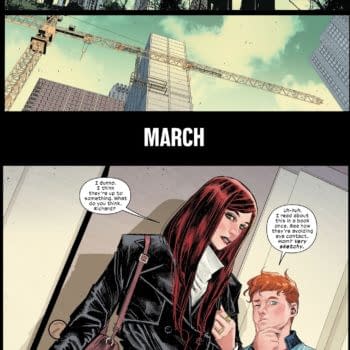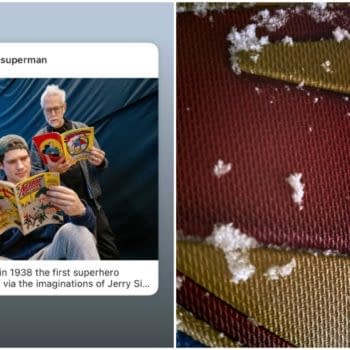Posted in: Comics | Tagged: Becky Cloonan Michael W Conrad
Crossing The Streams Of Indie And Mainstream, With Cloonan, DeConnick And Rodriguez
It used to be the case that indie comics creators set their sights on the mainstream, and if they managed to get there, they didn't look back. But things are changing. At this time it's the norm for most comics folks to be freelance agents and diversify their output, and this has altered the paradigm when it comes to the relationship between indie and mainstream comics. Creators are looking at the specific virtues of working in each arena and having weighed them, essentially saying, "I want both". At Heroes Con, Becky Cloonan (The True Lives of the Fabulous Killjoys, Demeter), Kelly Sue DeConnick (Captain Marvel, Ghost), and Robbi Rodriguez(Uncanny X-Men, Frankie Get Your Gun) explained their reasoning and experiences "crossing over and back" and argued for a hybrid lifestyle in personal terms. Jimmy Aquino (Comic News Insider) moderated this discussion of their evolution and new normal as indie/mainstream professionals.
As panellist introduced their work, there was obviously a wide range of publishers in hand for each. Rodriguez has worked with Oni Press, is self-publishing based on a webcomic, and has also worked with Vertigo, among other credits. Cloonan is working both with Dark Horse and through self-publication at the moment and DeConnick is publishing with Dark Horse, Marvel, and Image concurrently. A few years ago, this would have been an unusual range, but it also speaks to the rise in popularity of genre comics and their prominence at multiple publishing houses these days. Aquino asked firstly about how each panellist reached the realization that self-publication was possible, doing their "own comics" rather than using small projects as a path to the mainstream. Rodriguez's story is a familiar one for many indie creators. He started hands-on creating comic 'zines, storming Kinkos before shows, and eventually got picked up by Image for his work. He described himself as still "quasi-self-published" until recently, when he decided he'd "had it with small press publishing". This turned his attention to the web to launch the series Frankie Get Your Gun. Ironically, this personal move caught the attention of Marvel and DC and he was picked up by Vertigo. His motivations were unabashed in accepting. He's consciously publishing with Vertigo to fund and plug his creator-owned work and keep it moving. It's a direct reversal of the older indie to mainstream model, in fact.
Cloonan was no stranger to Kinkos either, and took to conventions, where meeting people and being seen made a big impact on her career through informal "networking". A major turning point for her came when Brian Wood, someone she had no knowledge of, e-mailed her asking if she'd like to meet with him to discuss a series called Channel Zero. She balked at meeting a strange guy in person, but eventually took him up on his offer. For Cloonan, who was used to producing her own indie comics, written and drawn by her, this was a major development in her work. She was handling a script by someone else for the first time, and also thinking carefully about her audience, trying to "put them first". She feels it helped her evolve her storytelling methods.
DeConnick's entry into comics stemmed from another featured change in the dynamic of comics fandom and comics creation: internet forums. She spent time "hanging out" on the Warren Ellis Forum (before the days of Engine), reflected that many of the people in her generation or "class" are now comic pros. There she shared and read writing by aspiring creators and generally held online meetings to talk about comics. Another venue of approach for DeConnick was through reviewing comics on the site ArtBomb, a path that is "not recommended", she clarified. She cautioned the audience about reviewing because taking a generally negative approach to comics, even if criticisms are deserved, can cause big problems for someone who goes pro down the line and had already rankled creators along the way. At ArtBomb, they generally took the approach of only reviewing things they felt deserved attention, so she didn't create too many vendettas to face later on. She advised, "It's probably a good idea not to talk shit about people you want to work with". As a pro now, she can confirm that creators are often very sensitive and will "hold grudges" about bad reviews. After reviewing, DeConnick translated Japanese comics into English as her first real gig, then moved through writing anthology pieces, to one-shots, to miniseries, and finally, full series. Her path makes sense, but also underlines the necessary rungs in the ladder it often entails to get into mainstream comics creating.

Aquino ramped up his line of questioning by asking the panellists whether they preferred working on indie or mainstream comics. DeConnick quickly got to the heart of her philosophy about this dichotomy. "I like both chocolate and vanilla", she said, "We don't have to be the Sharks and the Jets". She was emphatic that "most mainstream people love or have a few creator owned comics" and the "notion that it's us against them is silly". Her approach is simple: if she likes it, she does it. If she doesn't like it, she doesn't do it, whether it's indie or mainstream. Cloonan said that she's entering a phase now where she is "really comfortable knowing what I want to do, but it takes time", and that she's not particularly attracted to working on "team books", even though she reads them heavily, because she's afraid of "messing them up".
Rodriguez also felt he found his own personality and voice through doing creator owned work and decided that's "how I'm going to be". He actually wanted to do self-publishing straight out of the gate as a young artist because he didn't want to spend the time looking for a publisher, dealing with the "headaches" of not getting e-mails returned, and feel "left in the dark" by publishers about projects. Cloonan added that this is probably the greatest virtue of creator-owned work, that you have "control over every single element of the book", doing print on demand or publishing online. She recently started her own distribution company to allow for "wholesale", an online store founded with friends from her studio. This makes for a lot of personal busy work though, and all the panellists expressed a desire for assistants or help keeping it all on track. Rodriguez, though, likes the challenges he faced such as learning lettering, being an editor, and even packaging. For him, that's "fun" and keeps him on his toes.
DeConnick disagreed somewhat about the joys of being your own boss. "I am not such a genius that my work cannot be improved by an editor", she said. She feels her "strengths" are character and interaction/dialogue and that she's not as great when it comes to pacing. She was recently at ICAF in a panel discussing Auteur Theory in comics, and as a writer who doesn't draw, she was incensed by the idea that there's inherently something better about a comic project conceived of and drawn by a single individual. "I think there are some incredible team books", she said, "both independent and company books", and she found the "sweeping generalization" biased against people who are simply artists or writers by nature. Cloonan agreed, reflecting that in her time teaching at SVA, she encouraged students who wanted to work on "team" mainstream books as much as fine artists.
One of Aquino's questions that provoked the most amusing answers was whether or not these three had always set their sights on the mainstream, or more specifically superheroes. Each gave their "no" in various ways. DeConnick spent a lot of time wanting to be an actor, she said, and "went backward into comics", whereas Cloonan, remarkably, wanted desperately to be a Paleontologist. At least she kept her passion for drawing dinosaurs alive after failing in science. Cloonan also suspected that she'd never make it as a comics artist due to lack of skill until she discovered Manga and began to push onward with her "crude" drawings. Rodriguez announced that he wanted to be a "pro fighter" for a long time and his "fall back" was comic books. But his "fall-back" was pretty alluring for a guy who grew up reading EC reprints and imagining life in a bull-pen.
Rodriguez revealed a personal motivation in holding onto creator-owned work in his career; he feels he has to pursue what's closest to his creative yen because he's slowly losing his vision. With that in mind, he's keeping to a "timetable" for his career and adopting the no nonsense approach of using the mainstream for paychecks to fund his indie work. DeConnick, and of course the audience, were shocked to hear about Rodriguez impending loss of sight. "It got me to jumpstart decisions", he said, and to "talk to retailers and fans one-on-one". He strongly encouraged young creators to take advantage of all the options out there right now for self-publication, including Kickstarter, and wishes he was starting off again now himself.
Aquino asked DeConnick, specifically, about putting up her own money for publicizing Hawkeye, a "gamble" that "paid off" for her. "Marvel has been very, very good to me", she said, "Marvel isn't a person. Marvel doesn't love me. There are amazing people at Marvel. They are not Marvel". Because of the realities of working with a big company, DeConnick made decisions for self-promotion and "out of pocket costume re-design" that "worked out" for her. She and Matt Fraction printed buttons, postcards, t-shirts, the works, and though it worked well, she says she wouldn't bother to do that again for "company books" because she couldn't make much money off of it. She did, however, proceed to reveal one of the strategies that keeps her in motion reaching her varied goals, having semi-annual meetings with Fraction where they tackle their long and short term goals and give status updates. As freelancers, they feel this is very important to keep them financially solvent and hopefully able to retire someday. These meetings helped them decide they could afford to hire a part-time assistant, a decision that's had a very positive impact on their work.
This was one of several panels at Heroes Con that went overtime due to the breadth of conversation among panellists and with the audience, and the common denominator seemed to be that panellists were intent on sharing real tips and wisdom to help out aspiring creators. Cloonan, DeConnick, and Rodriguez collectively pointed out that crossing back and forth between indie and mainstream regularly requires plenty of self-knowledge about your own creative goals and also a substantial amount of organization and forward-thinking. But it's certainly not an impossible feat, as they illustrated, and it's one they actively encourage others to take on when it could serve their needs.
Hannah Means-Shannon is a comics journalist and scholar working on books about Alan Moore and Neil Gaiman for Sequart.org. She is @HannahMenzies on Twitter and @hannahmenziesblog on WordPress. You can see her other Heroes Con reports at The Beat, On the Scene: Image Crowds the Dais at Heroes Con 2013 , On the Scene: How Awesome is Heroes Con, On the Scene: Valiant Reveals Game Plan at Heroes Con 2013, and On the Scene: Jason Aaron, Greg Rucka, Jason Latour Talk Crime Comics at Heroes Con 2013.









